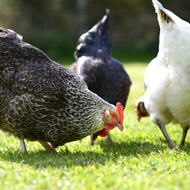H5N8: Birds in England to be let outside

All poultry keepers must continue to observe strict biosecurity measures.
All poultry in England will be allowed outside from 13 April, the UK’s chief veterinary officer has announced. The move follows updated evidence on the risk of avian influenza from wild birds.
A prevention zone was introduced on 6 December 2016, requiring poultry to be housed indoors, but from 28 February, only poultry keepers in the higher risk areas of England were required to house or fully net their birds.
The measure will now be lifted as the latest scientific evidence and veterinary advice concludes the threat to poultry in the high risk areas has lowered, and is now at the same level as the rest of the country. The majority of over-wintering migratory birds have now left the UK and resident waterfowl are at their lowest levels and entering the breeding season, when they will be less likely to travel long distances for food.
However, all poultry keepers must continue to observe strict biosecurity measures and a ban on poultry gatherings remains in force until further notice.
Chief veterinary officer Nigel Gibbens said: “This does not mean business as usual: the risk from avian flu has not gone away and a prevention zone remains in place, requiring keepers across England to take steps to prevent disease spreading.”
This includes minimising movements in and out of bird enclosures, cleaning footwear, keeping areas where birds live clean and tidy and feeding birds indoors. Keepers with over 500 birds will still be required to comply with additional requirements.
Avian influenza H5N8 has been found in wild and farmed birds in the UK since December 2016. The risk remains heightened and countries across Europe continue to see outbreaks. Defra is stepping up surveillance of wild birds in the UK to inform risk assessments.
Poultry keepers that are planning to let their birds out on Thursday are advised to take action now to minimise residual contamination in outdoor areas, and consult with their vet if they are concerned about the risks to their birds.
Defra guidance can be found here: https://www.gov.uk/guidance/avian-influenza-bird-flu#detailed-advice



 The Veterinary Medicines Directorate (VMD) is inviting applications from veterinary students to attend a one-week extramural studies (EMS) placement in July 2026.
The Veterinary Medicines Directorate (VMD) is inviting applications from veterinary students to attend a one-week extramural studies (EMS) placement in July 2026.